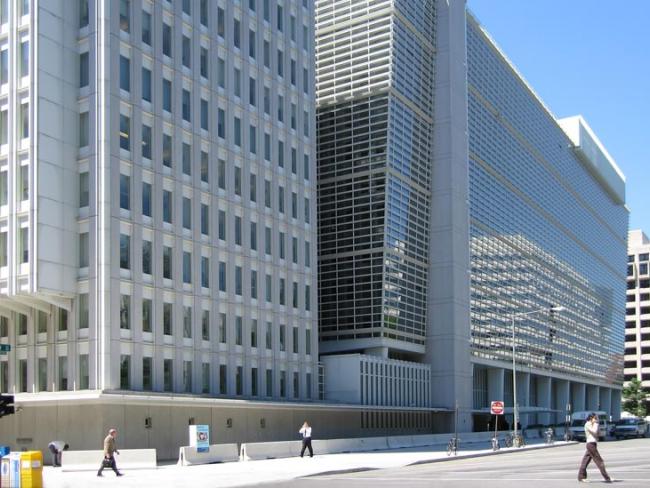
World Bank headquarters, Washington DC – dominated by the new capitalists. Photo Shiny Things, via Wikimedia Commons.
This book describes how modern, transnational capitalism operates against the interests of workers everywhere, out of reach of national governments…
The capitalists of the 21st century: an easy-to-understand outline of the new financial players, Werner Rügemer, paperback, 308 pages, ISBN 978-374971162-8, Tredition, 2022, £14.99. Kindle and eBook editions available.
In this excellent book Werner Rügemer presents the new financial bodies which the 1983 Thatcher Big Bang let rip. Large capital organisers, private equity funds, hedge funds, venture capitalists, and private investment banks have become far more powerful than traditional, more regulated banks. They organise worldwide selling, buying and restructuring of banks, companies and public enterprises. They exploit existing value; they do not create new value.
They dominate governments and the international financial institutions like the International Monetary Fund, the World Bank and the City of London. They lower wages and increase private gains. They collude with law firms, rating and PR agencies, management consultants and central banks. They believe in a borderless world. They pay no heed to the economies and needs of nations.
US companies dominate, but Britain is also a key base. Of the 100 most valuable companies of Western capitalism in 2017, 52 were from the USA, headed by the tech sector. Six companies were from Britain.
London
Of the 50 largest private equity investors, 31 were based in the USA, eight in London, two in Canada, two in China, and one each in seven other countries.
Of the largest dozen hedge funds in 2016, ten were based in the USA, two in London. Almost 70 per cent of all such funds are domiciled in the Cayman Islands. This British Overseas Territory is a tax haven ranked second only to the British Virgin Islands, living on fees from the transnational capitalist class.
One of the main roles of private equity companies is hiding the capital of hundreds of thousands of wealthy clients in secretive tax havens, out of the reach of national governments.
Rügemer points out that of all the world’s capitalist countries, none is as much under foreign ownership as Britain. The US investment company BlackRock is one of the three investors with the highest ownership of the 100 most important British companies in the FTSE index.
BlackRock is the world’s largest shadow bank, co-owner of over 17,000 companies worldwide. It has hundreds of billions of dollars at its disposal, topped up by bank loans when a company is purchased. So far it has asset-stripped several hundred companies.
Impoverishment
In the 1980s, the new financial players accelerated the de-industrialisation of the USA, causing impoverishment of the US working class and enrichment of the capitalist class. Since 2000, they have been doing the same in the EU. They attack trade unions and limits on working hours. They attack compulsory social insurance, protections against dismissal, and collective agreements.
‘They believe in a borderless world. They pay no heed to the economies and needs of nations…’
Since its inception in 1958, the European Commission’s highly paid, lightly taxed and legally privileged bureaucracy has aided the dismantling of trade union rights, most recently through the so-called European Pillar of Social Rights. It upholds the interests of private companies in the EU and worldwide.
Acting for the European Commission, BlackRock organised the stress test for the 39 largest banks in the EU, many of which it co-owns. It also prepared the risk analyses for bank bailouts in Ireland, Greece, Britain and Cyprus.
Mario Draghi, ECB president from 2011 to 2019 and later appointed prime minister of Italy from February 2021 to October 2022, re-modelled the ECB on the US central bank, the Federal Reserve, and aided US banks and investors to gain access to the European market.
In 2017 BlackRock hired ex-Chancellor George Osborne, who had pushed through the “pensions revolution” in Britain, allowing early access to pension savings and freedom to choose financial products promoted by BlackRock and similar firms.
On behalf of the European Commission, Osborne pushed through the Pan European Personal Pension Product. Employees in the other EU member states were also supposed to buy the financial products called ishares (collections of Exchange-Traded Funds) for private retirement provision managed by BlackRock, with no payment guarantee.
Rügemer ends with five chapters on what he calls “the communist-led capitalism in the People’s Republic of China”. He argues that, “The state has gradually replaced the centrally planned economy with a mixed but regulated economy… a fair number of foreign investments are channelled through the financial havens of the Netherlands, Luxembourg, Ireland and the Cayman Islands. China has adopted other Western instruments in form: venture capital financing, private equity funds and public-private partnerships.”
By 2015, Rügemer writes, China ranked third in terms of the volume of foreign investment, behind the USA and Britain. Over 20,000 Chinese companies are owners, or joint owners, of foreign companies across 140 countries.
The right to strike was cut from the Chinese constitution in 1982. A state founded as a dictatorship of the proletariat now forbids the working class to act in its own interest.
